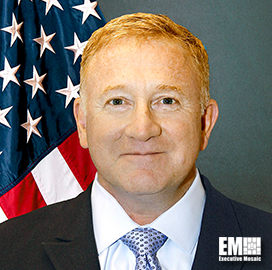Soldiers need physical fitness and mental fortitude to keep them one step ahead of the adversary. The proliferation of wearable technology and the biofeedback and neurofeedback data it generates have created new opportunities to quantify and evaluate tactical athletes’ performance and leverage quantitative data to design the highest performing squads.
During Potomac Officers Club’s Future Battlefield Series: Soldier Performance Virtual Event, notable federal and industry leaders will meet to discuss a strategy that leverages human performance expertise to enable warfighters to optimize their cognitive and physical wellbeing throughout the entire mission lifecycle.
To register for the virtual event, as well as view upcoming opportunities, visit Potomac Officers Club’s Event Page.
The U.S. Army’s tactical network modernization team recently announced that the division will work to integrate wearables with augmented reality combat goggles to bolster cybersecurity.
Donald Coulter, senior science and technology adviser to the Network Cross-Functional Team, reported that one of the team’s priorities for 2021 is to advance wearable technology for user authentication.
Under current capabilities, users are authenticated using passwords, common access cards or tokens to verify themselves. But these capabilities aren’t good enough in an operational environment. “These can be broken, damaged [or] lost in an operational environment,” Coulter said.
With the wearables, soldiers' identities are verified using biometric data such as heart rates, gait, unique skin signatures and physical locations. Wearable technology will make the Army’s systems more secure, while being more intuitive for the soldier in the field.
In addition, The U.S. Army is working with Fitbit on wearable technology that has pre-symptom COVID-19 diagnostic capability.
The company was selected by the U.S. Army Medical Research and Development Command (USAMRDC) under a $2.5 million contract from the U.S. Department of Defense through a Medical Technology Enterprise Consortium (MTEC)
Under the contract, Fitbit will advance development of a wearable diagnostic capability for the early detection of a COVID-19 infection.
“The Department of Defense (DoD) seeks rapid, accurate wearable solutions to identify and isolate pre-symptomatic COVID-19 cases and help track and prevent the spread of the virus,” said commander Christopher Steele, Director of the Military Operational Medicine Research Program at USAMRDC.
Fitbit will work to integrate wearable illness detection capabilities to its users as soon as possible. Fitbit is working to initiate a prospective study with Northwell Health’s Feinstein Institutes for Medical Research to advance development and validation of the Fitbit algorithm to detect COVID-19.
“Wearable technologies, valuable data metrics and potentially rapid scaling solutions for broad availability create ideal conditions for military and industry partnerships in the consumer wearables space,” Steele added.
The U.S. Air Force continues to face a pilot shortage of about 2,100 or roughly 10% of the 21,000 pilots it needs to execute the National Defense Strategy, the service has undertaken a number of initiatives to increase the production of pilots, including programs that utilize augmented and virtual reality (AR/VR), as well as “plug-and-play” solutions to train pilots.
Last year the Defense Advanced Research Projects Agency (DARPA) provided $104 million in funding to the Next-generation Nonsurgical Neurotechnology Program (N³), which was being led by three graduate students at Carnegie Mellon University in Pittsburgh.
The direct brain-machine interface could enable soldiers to act more quickly and increase their ability to make decisions. Join Potomac Officers Club’s Future Battlefield Series: Soldier Performance Virtual Event to learn more about the future of soldier performance and wearable technology.
Doug Tamilio, director of Combat Capabilities Development Center (CCDC), Soldier Center (SC) with the U.S. Army, will be featured as a keynote speaker during Potomac Officers Club’s Future Battlefield Series: Soldier Performance Virtual Event on November 19th 2020.
To register for the virtual event, as well as view upcoming opportunities, visit Potomac Officers Club’s Event Page.





